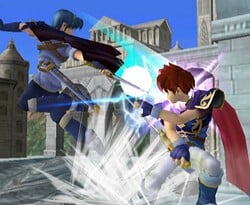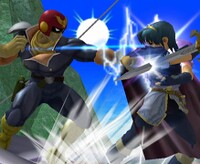Counter
- This article is about the move. Counter can also be used to describe a match-up that strongly favors one character.
| Counter | |
|---|---|
 Roy, countering Marth's attack in Melee. | |
| User | Marth, Roy, Ike |
| Universe | Fire Emblem |
Counter (カウンター Kauntā) is the name of a move belonging to several characters in the Super Smash Bros. series, namely, the characters from the Fire Emblem series.
In Super Smash Bros. Melee
Counter is Marth and Roy's down special move in Super Smash Bros. Melee. Marth or Roy will strike a pose and a small, metallic "chink" sound will be heard. For about a second, any attack other than a grab which the character using Counter is struck by will turn them invincible for the duration of their retaliating swing. Marth's Counter deals up to 7% damage, regardless of the attack, while Roy's deals 1.5 times the original attack's damage. If the attack is a projectile (such as Samus' Missile), it will simply be deflected behind them and upwards at about a 30 degree angle. It's worth noting explosive projectiles can still explode and will still do damage if they are struck when the invincibility ceases. If the attack is a smash attack, then the attacker will be knocked back at a 90 degree angle. If used in conjunction with Mr. Game & Watch's Oil Panic, it is the most powerful non-charged attack in Melee (if Oil Panic has absorbed the highest possible amount of damage, which is 250% damage and delivers a OHKO).
Marth's Counter has a faster start-up time and lasts twice as long as Roy's Counter, which makes Marth's Counter more effective but less damaging.
In Super Smash Bros. Brawl
Ike also has this attack as his down special move in Super Smash Bros. Brawl. Ike's Counter is not as fast as Marth's, as his counter frames start roughly 6 frames after Marth's, but reflects back x1.2 damage, with the minimum damage being 10%. Marth's Counter reflects back x1.1 damage, with a minimum damage of 8%.
Since Ike's Counter is a bit slower, it cannot be used for immediate countering (although Ike's Counter has more knockback and greater range). Although Marth and Ike both have the same duration of counter frames, Ike has less vulnerability after the counter frames end, due to the slightly slower activation of his. Both Counters last the same amount of time from start (initiating the command) to finish (when the player is free to move again); Marth's simply activates faster, but his counter frames end 6 frames before Ike's. Marth's Counter leaves him vulnerable at the end of the attack while Ike's counter leaves him vulnerable at the beginning. If Marth or Ike counters a large hitbox such as Mr. Game and Watch's Oil Panic (after absorbing three strong enough projectiles that does 60% damage), it will one-hit KO anyone who is very close to Marth or Ike. There are several other moves similar to Counter: Double Team, Toad, and (to a lesser extent) Wolf's Reflector.
Description from the Brawl Instruction Booklet
Block the enemy's attack with the sword.
Origin
This move seems to be based on the fact that, in the Fire Emblem games, characters will always counterattack after an enemy's move if possible.
Gallery
Trivia
- Marth's Counter can be used on Kirby's Inhale attack in Brawl or any other Vacuum created by an attack.
- If three or more Marths are playing, it is possible to repeatedly Counter to huge amounts of damage. For this to work with Ike or Roy, who have slower counter strikes and slower counter activations than Marth, it is recommended to have four players play as Ike or Roy.
- Marth can use Counter on the tides of lava and acid on Norfair and Brinstar. When the stage-wide wave of lava appears on Norfair, Marth can stand outside of the Capsule and time Counter correctly to avoid the damage.
- Since only damage is countered, not knockback, the forward smash of a Home-Run Bat will deal less knockback when countered.


